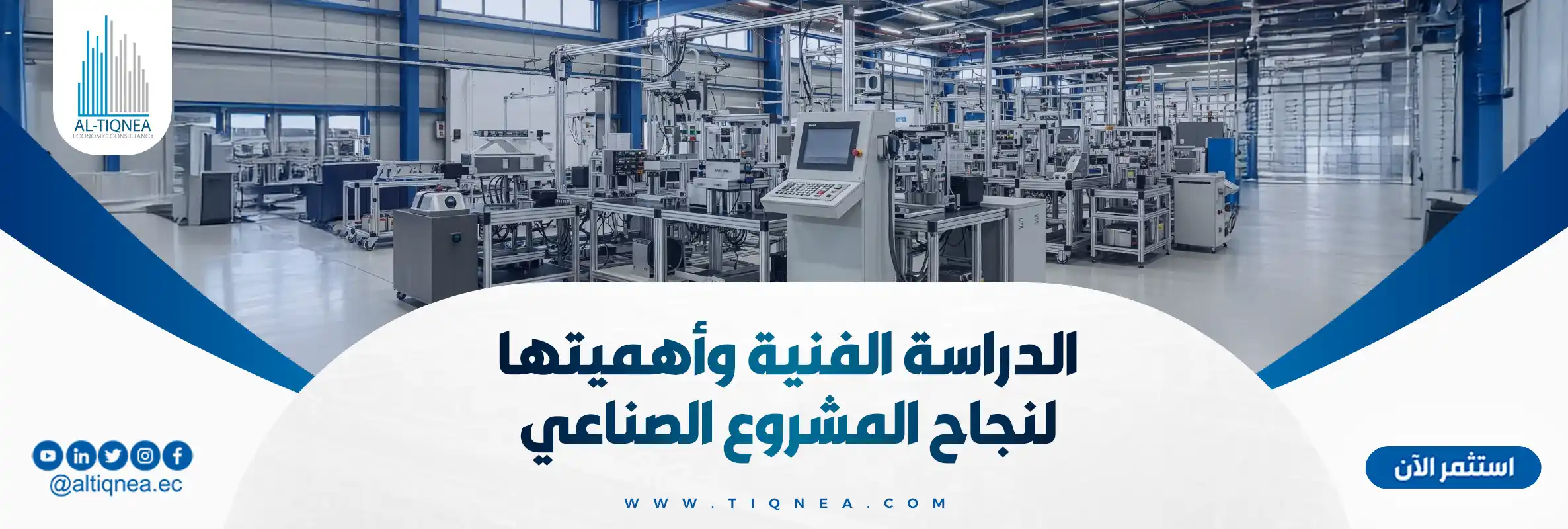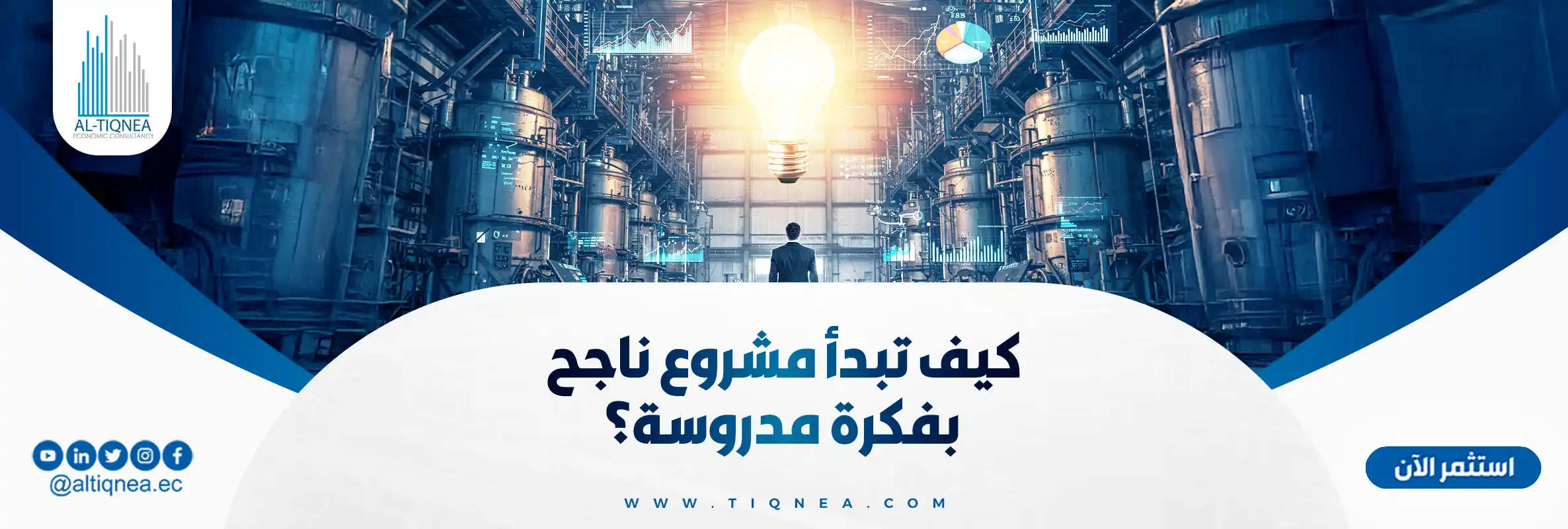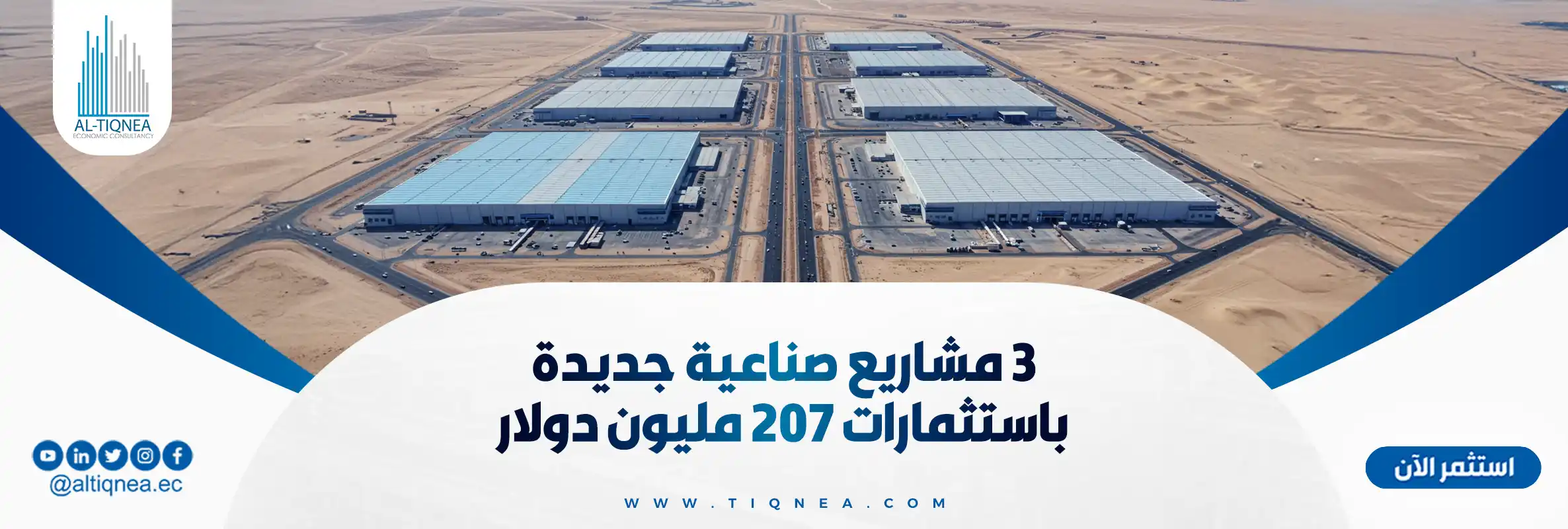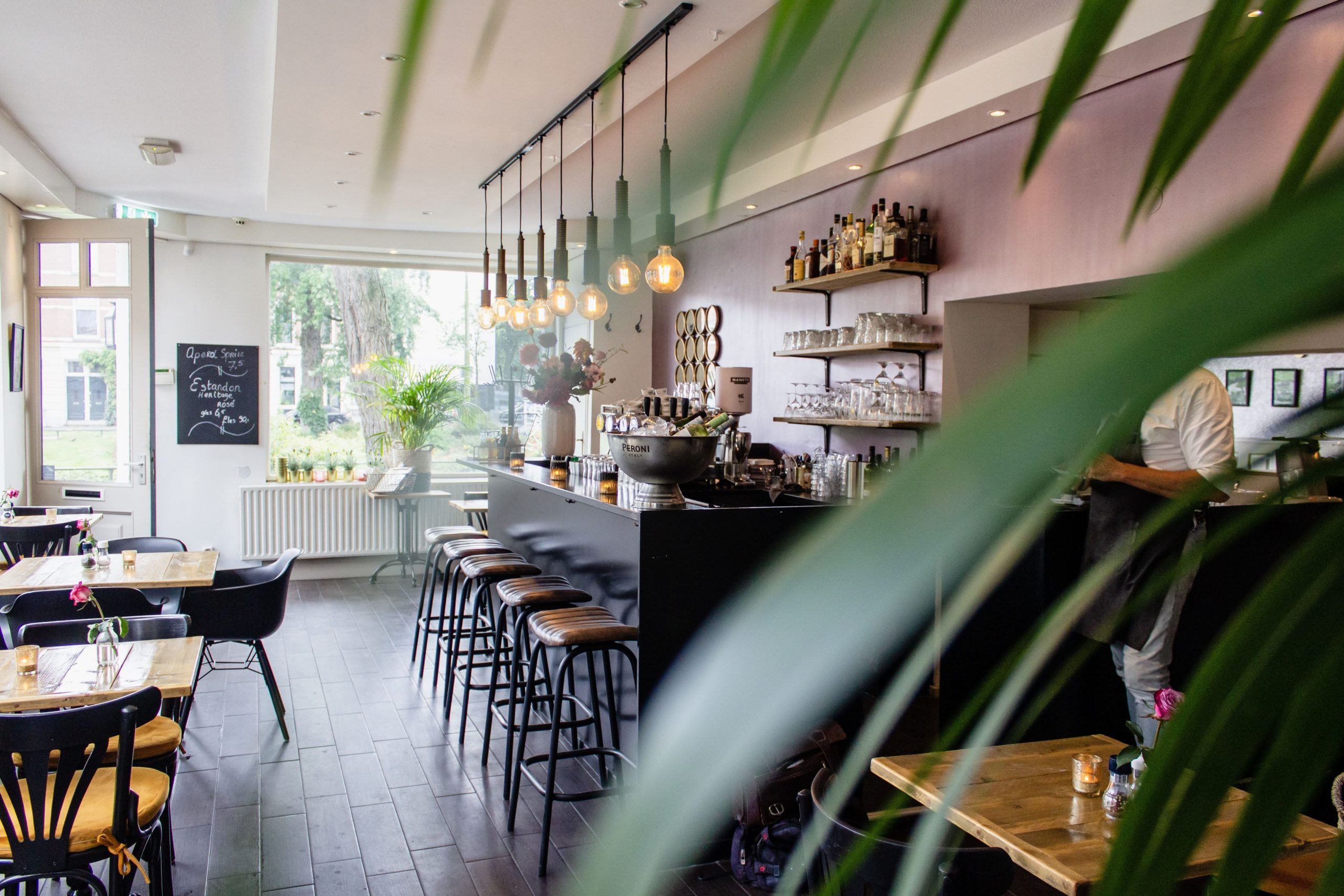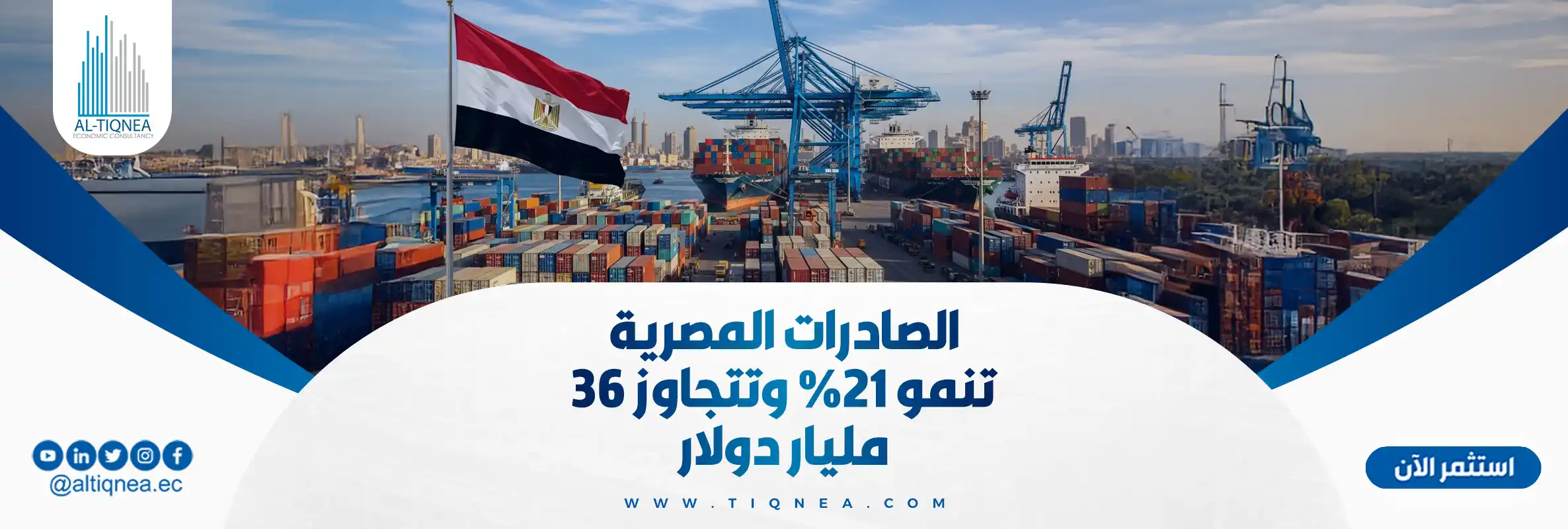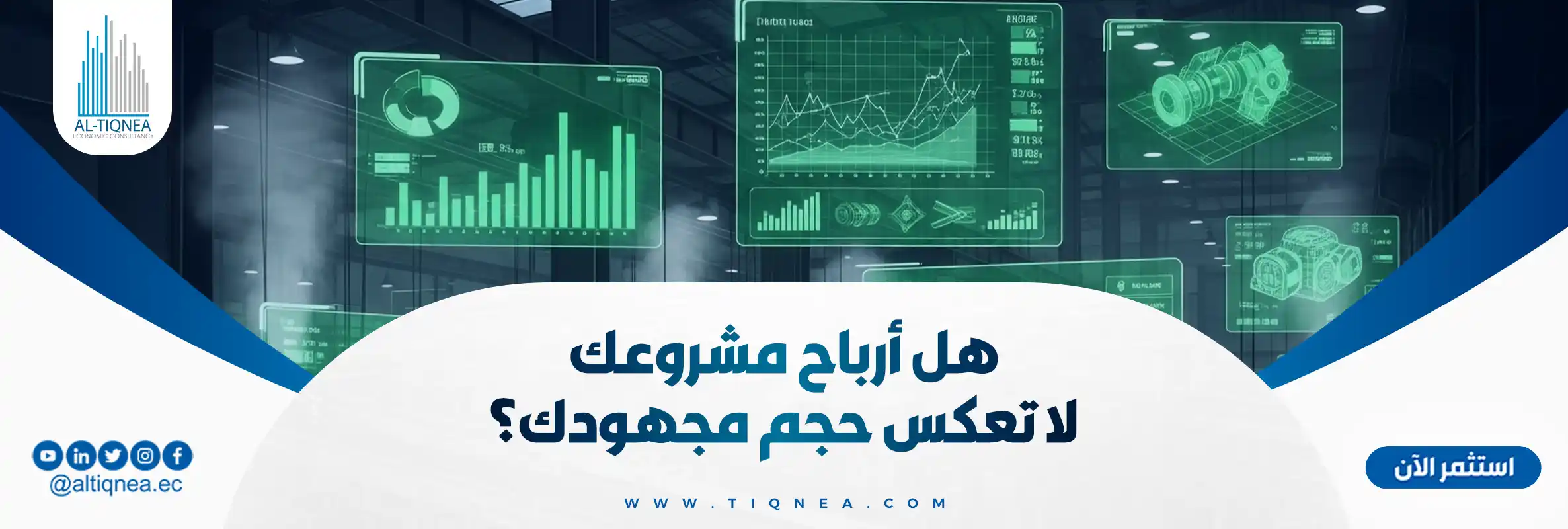الدراسة الفنية وأهميتها لنجاح المشروع الصناعي
تُعد الدراسة الفنية أحد الأعمدة الأساسية في إعداد دراسة الجدوى الصناعية، فهي التي تحدد الصورة الواقعية لإمكانات تنفيذ المشروع على أرض الواقع.
في شركة التقنية للاستشارات الاقتصادية، لا نكتفي بتقديم أرقام نظرية، بل نُجري تحليلاً دقيقًا لكافة العناصر الفنية للمشروع بدءًا من اختيار موقع المصنع وحجم الإنتاج والطاقة التشغيلية، وصولًا إلى تحديد المعدات وخطط التشغيل الفعلية.
نهدف من خلال هذه الدراسة إلى ضمان أن مشروعك الصناعي قابل للتنفيذ فنياً وعملياً، ويحقق أعلى كفاءة إنتاجية بأقل تكلفة ممكنة، مما يمهد الطريق أمام نجاح مالي واستثماري مستدام.
تعرف على المكونات الأساسية للدراسة الفنية
- تحديد مراحل تشغيل المصنع بدءًا من الإعداد وحتى التشغيل الفعلي.
- توضيح خطوات تصنيع المنتج محل الدراسة بدقة، مع تحديد العمليات الإنتاجية الأساسية.
- جمع عروض أسعار المعدات والآلات المطلوبة للمشروع، ومقارنة البدائل لاختيار الأنسب من حيث الجودة والتكلفة.
- دراسة الطاقة الإنتاجية الحالية للمشروع وإمكانيات التوسع المستقبلي وفقًا لاحتياجات السوق.
- حصر احتياجات المشروع من المواد الخام ومواد التعبئة والتغليف وغيرها من المدخلات، مع تقدير تكلفتها وسعر بيع المنتج النهائي.
- تحديد الموقع الانسب للمشروع وتقييم المساحة المطلوبة بناءً على متطلبات التشغيل والإنتاج.
- حصر احتياجات المشروع من المرافق والخدمات مثل الكهرباء والمياه والوقود والزيوت والشحوم، وتقدير تكلفتها التشغيلية بدقة.
ما هي مراحل تشغيل المصنع وفقًا لطبيعة المشروع؟
تبدأ مراحل تشغيل المصنع وفقًا لطبيعة المشروع محل الدراسة، حيث يجب أن تتماشى جميع خطوات التشغيل مع متطلبات النشاط الإنتاجي المستهدف لضمان تحقيق أعلى كفاءة ممكنة. وتشمل هذه المراحل ما يلي:
- تحديد مراحل التشغيل بما يتناسب مع طبيعة المشروع، لضمان تسلسل منطقي ودقيق في تنفيذ الأعمال الإنتاجية والتشغيلية.
- استخراج الشهادات والتراخيص اللازمة لمزاولة النشاط الصناعي، وفقًا للضوابط المعتمدة من الجهات المختصة، لضمان قانونية التشغيل وسلامة الإجراءات.
- تجهيز المباني والإنشاءات الخاصة بالمصنع من حيث التصميم، والتقسيم الداخلي، والبنية التحتية، بما يتناسب مع نوع الآلات وخطوط الإنتاج ومتطلبات السلامة المهنية.
- شراء المواد الخام ومتطلبات التشغيل، مع وضع خطة دقيقة للتخزين تضمن الحفاظ على جودة المواد وتقليل الفاقد أثناء عملية الإنتاج.
- توريد وتركيب الآلات والمعدات الخاصة بالإنتاج والتغليف أو التعبئة الخاصة بالمنتجات محل الدراسة، مع مراعاة معايير الجودة والتشغيل الاقتصادي.
- إعداد وتنفيذ خطة الدعاية والإعلان والتسويق للمنتجات، بما يضمن وصولها إلى الأسواق المستهدفة وتحقيق الانتشار المطلوب في المراحل الأولى من التشغيل.
- توظيف العمالة والفنيين وفقًا للمهارات والخبرات المطلوبة لكل مرحلة من مراحل الإنتاج والتشغيل لضمان سير العمل بكفاءة عالية.
- بدء التشغيل الفعلي للمصنع وإنتاج المنتجات المستهدفة وفق الخطة التشغيلية الموضوعة مسبقًا.
- فحص عينات عشوائية من الإنتاج للتأكد من مطابقة المنتجات لمعايير الجودة المحددة، وضمان رضا العملاء.
- تعبئة أو تغليف المنتجات باستخدام المواد المناسبة، ثم نقلها إلى أماكن التخزين المخصصة وفقًا لطبيعة كل منتج وشروط الحفاظ على جودته.
آلية تصنيع المنتج محل الدراسة
1. توضيح مراحل التصنيع:
يتم وصف جميع مراحل تصنيع المنتج محل الدراسة من خلال إعداد مخطط تدفق (Flow Chart) يوضح تسلسل العمليات الإنتاجية خطوة بخطوة مع شرح تفصيلي لكل مرحلة.
2. الحصول على عروض أسعار للآلات والمعدات:
يتم التواصل مع أكثر من جهة متخصصة لتقديم عروض أسعار شاملة للآلات والمعدات المطلوبة لتنفيذ عملية الإنتاج، مع مراعاة جودة المعدات وكفاءتها التشغيلية.
3. عروض أسعار خطوط الإنتاج:
يتم الحصول على عروض أسعار لخط الإنتاج الكامل من عدة شركات، مع مقارنة طرق الإنتاج والتكنولوجيا المستخدمة ومدى ملاءمتها لطبيعة المنتج محل الدراسة.
4. إعداد نبذة عن الشركات الموردة:
يتم إعداد ملف مختصر عن كل شركة تم الحصول منها على عروض الأسعار، يتضمن خبراتها السابقة ومواصفاتها الفنية ومدى التزامها بمعايير الجودة.
5. المقارنة بين العروض واختيار الأنسب:
يتم إجراء مقارنة تفصيلية بين عروض الأسعار المقدمة، لتحديد العرض الأنسب من حيث الكفاءة الفنية والتكلفة الإجمالية، مع توضيح الأسباب التي تم بناءً عليها اتخاذ قرار الاختيار.
6. العرض الفني للآلات والمعدات:
يتم إعداد بيان فني شامل بالآلات والمعدات التي يتضمنها العرض الذي تم اختياره، مع إرفاق الصور الخاصة بالمعدات إن وُجدت، لتقديم تصور واضح عن منظومة التشغيل المقترحة للمشروع.
اطلب دراسة الجدوى الخاصة بمشروعك الآن
شركة التقنية للإستشارات الإقتصادية، دراسة الجدوى وتنفيذ المشروعات.. شركة معتمدة رائدة في الاستشارات الاستثمارية والإدارية للشركات والمؤسسات المحلية والدولية، سابقة أعمال كبيرة من المشاريع ودراسات الجدوى الناجحة في مصر والوطن العربي.
لطلب دراسة جدوى مشروعك أو تحديد مقابلة تواصل معنا الان وسيتواصل معك أحد خبرائنا في أقرب وقت.
The Technical Study and Its Role in Industrial Project Success
The technical study is one of the fundamental pillars in preparing an industrial feasibility study, as it defines the realistic picture of the project’s potential for implementation on the ground.
At Al-Tiqnea Economic Consulting, we go beyond providing theoretical figures — we conduct an in-depth analysis of all the technical elements of the project, starting from the selection of the factory’s location, production capacity, and operational scale, to the identification of machinery and actual operating plans.
Our goal through this study is to ensure that your industrial project is technically and practically feasible, achieving the highest production efficiency at the lowest possible cost — paving the way for sustainable financial and investment success.
Key Components of the Technical Study
-
Defining the stages of factory operation, from preparation to full-scale production.
-
Clarifying the detailed steps of the product manufacturing process, specifying all core production operations.
-
Collecting and comparing price quotations for the required machinery and equipment to select the best options in terms of quality and cost.
-
Studying the project’s current production capacity and future expansion possibilities according to market needs.
-
Listing all raw materials, packaging materials, and other inputs required for the project, with an estimation of their costs and the final product’s selling price.
-
Identifying the most suitable project location and evaluating the required space based on production and operational needs.
-
Determining the project’s requirements for utilities and services such as electricity, water, fuel, lubricants, and oils, while accurately estimating their operational costs.
Factory Operation Stages According to the Nature of the Project
The stages of factory operation vary according to the nature of the project under study. All operational steps must align with the targeted production activity to ensure maximum efficiency. These stages include:
-
Defining operational phases in line with the project’s nature to ensure a logical and precise sequence of production and operational activities.
-
Obtaining all necessary licenses and permits required for industrial activity in accordance with regulations, ensuring legal compliance and operational safety.
-
Preparing factory buildings and infrastructure — including design, internal layout, and construction — to suit the type of machinery, production lines, and occupational safety requirements.
-
Purchasing raw materials and operational requirements, along with establishing an efficient storage plan to maintain material quality and reduce waste during production.
-
Supplying and installing production, packaging, or filling equipment related to the project’s products while ensuring quality standards and cost-effective operation.
-
Developing and executing marketing and advertising plans to promote products, ensuring they reach target markets and achieve visibility during early production stages.
-
Hiring workers and technicians with the necessary skills and expertise for each production phase to ensure high operational efficiency.
-
Starting actual factory operations and producing the target products according to the pre-set operational plan.
-
Testing random product samples to verify compliance with established quality standards and ensure customer satisfaction.
-
Packaging the final products using suitable materials and transferring them to designated storage areas according to each product’s nature and preservation requirements.
Product Manufacturing Mechanism
1. Explaining Manufacturing Stages:
All manufacturing stages of the studied product are illustrated through a detailed flowchart showing the step-by-step production sequence, with a clear explanation of each phase.
2. Obtaining Machinery and Equipment Quotations:
We contact multiple specialized suppliers to obtain comprehensive quotations for the required production machinery and equipment, taking into account their quality and operational efficiency.
3. Production Line Quotations:
We obtain full production line quotations from several companies and compare different production technologies to determine their suitability for the product under study.
4. Supplier Profiles:
A brief profile is prepared for each supplier, including their previous experience, technical specifications, and compliance with quality standards.
5. Comparative Analysis and Selection:
A detailed comparison of all quotations is conducted to select the most suitable option in terms of technical performance and overall cost, along with the justification for the selection decision.
6. Technical Equipment Report:
A comprehensive technical report is prepared for the selected machinery and equipment, including photos (if available), to provide a clear vision of the proposed operational system for the project.
Request Your Feasibility Study Today
Al-Tiqnea Economic Consulting is a certified and leading firm in investment and management consulting for local and international companies and institutions.
We have an extensive track record of successful feasibility studies and project implementations across Egypt and the Arab world.
To request your feasibility study or schedule a consultation, contact us now, and one of our experts will get in touch with you shortly.

